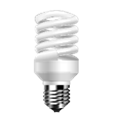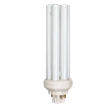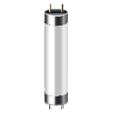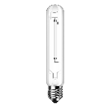Information for businesses:
Impacts of products containing mercury regulations
As of June 2025, the Products Containing Mercury Regulations (the Regulations) has been updated to prohibit the import, manufacturing and sale of all products containing mercury with some exemptions.
These regulations may affect:
- importers, manufacturers and sellers of lamps or products containing mercury
- retailers of lamps containing mercury
- exporters
- lamp collectors
New prohibitions for lamps
New prohibitions on the import, manufacture, and sale of lamps containing mercury used for general lighting will come into force in the coming years. The first prohibition will begin January 1, 2026.
All these lamps can be replaced with light-emitting diode (LED) technology, which is mercury-free, has a longer life and is more energy efficient.
Phase-out schedule for mercury-containing lamps:
| Lamp types | Start date for import and manufacture ban | Exemption period for the import and manufacture of replacement lamps | Start date for sales ban |
|---|---|---|---|
 Screw-base compact fluorescent |
January 1, 2026 | None | None |
 Pin-based compact fluorescent |
January 1, 2026 | From January 1, 2026 to December 31, 2027 | January 1, 2030 |
 Straight fluorescent |
January 1, 2026 | From January 1, 2026 to December 31, 2027 | January 1, 2030 |
 Non-linear fluorescent |
January 1, 2026 | From January 1, 2026 to December 31, 2027 | January 1, 2030 |
 High pressure sodium vapour |
January 1, 2029 | Starting on January 1, 2029 | None |
 Metal halide |
January 1, 2029 | Starting on January 1, 2029 | None |
Exempted products
The Regulations continue to have limited exemptions for essential products, such as:
- encapsulated dental amalgam
- analytical reagent for use in a laboratory
- fluorescent lamps used for growing plants, water treatment or air disinfection
These exempted products must meet labelling requirements
Please consult the Regulations for the complete list of exemptions, and for product-specific requirements.
Reporting and record-keeping requirements
Importers and manufacturers must:
- submit a report as per the schedule below, and
- keep records about these products for 5 years
| Calendar year of data to report | Report due date |
|---|---|
| 2025 | March 31, 2026 |
| 2027 | March 31, 2028 |
| Every third year after (for example 2030) | March 31st of every third year after (for example March 31, 2031) |
Alternate format
What businesses can do
To understand how the Regulations may impact your operations:
- read the documents available for a full understanding of how the Regulations apply to your operations
- work with your suppliers to ensure that you only import items that meet regulatory requirements
- phase out your import, manufacture and sale of prohibited items by the required deadlines
- use the best practices outlined in the Code of practice: environmentally sound management of end-of-life lamps containing mercury
- Follow the requirements of the export of substances on the export control list regulations
Contact us
If you have any questions or concerns, please contact your regional Environment and Climate Change Canada (ECCC) office by email:
Atlantic: promo-atl-compro@ec.gc.ca
Quebec: mercure-qc-mercury@ec.gc.ca
Ontario: promcon-on-compro@ec.gc.ca
Prairie and Northern: promconrpn-compropnr@ec.gc.ca
Pacific and Yukon: mercure-py-mercury@ec.gc.ca
All regulations under the Canadian Environmental Protection Act, 1999 are subject to the Compliance and enforcement policy.
Note: This material has been prepared for convenience of reference only and does not have an official character. For the purpose of interpreting and applying the Regulations, please consult the Canadian Environmental Protection Act, 1999 and the Regulations on Justice Canada’s website.
